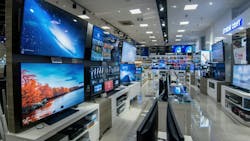A high-def history reminder as we focus on the future
Any time I get a chance to drive an electric truck or talk to a fleet leader about the challenges ahead for this transportation transformation our industry is experiencing, I think of HDTVs.
The first time I saw a high-definition TV in person, I was a poor college student looking for a new television at a Nobody Beats the Wiz electronics store in the late 1990s. The flat screen displayed a football game with such detail that I could count the grass blades. The future was in high-definition, but I was bound to walk out of the New York store that day lugging a heavy box TV. The new technology was amazing—but too expensive for a guy who thought getting dinner at Wendy’s was splurging.
Along with vivid colors and details, the HDTV on display also boasted a five-figure price. The classic CRT-tube RCA I ended up with (and lugged from apartment to apartment for the next several years) was a few hundred bucks. At that point, I could not fathom ever spending $10,000 on a TV.
And, lucky for me, I never had to. Within a decade, the technology behind HDTVs improved, and prices plummeted as more manufacturers offered crisp pictures on lighter sets. When I finally bought my first HDTV, it cost only a little more than that RCA box did in 1999.
As I prepare to attend the Advanced Clean Transportation Expo next week, I’ve been thinking a lot about all the expensive transportation technology we’ll see spread out across the Las Vegas Convention Center’s West Hall over the next several days.
Fleet leaders looking at new, high-tech electric and alt-fuel trucks might feel like I did while looking at those high-tech TVs 25 years ago: It’s a fantastic technology, but I don’t see how it could fit into my life today. Now, I cannot imagine where I would even fit a tube TV in my house (and grimace at the thought of lugging one up the stairs).
I am not sure if all fleet leaders and truck drivers will feel the same way about EVs, fuel cells, and internal combustion engines running on renewable fuels 10 or 20 years from now. But it’s almost assured that these new transportation technologies are bound to get cheaper and more accessible. After all, the greenhouse gas-reduction technology loaded into newer heavy-duty trucks is getting more expensive to produce and more complex to maintain.
It’s no wonder OEMs and fleets are preparing for the 2027 prebuy. It makes sense to get your hands on as much current equipment now as possible so you feel less of a push to adopt new technologies sooner.
Starting in 2027, the Environmental Protection Agency’s Clean Trucks Plan will mandate manufacturers to sell more zero-emission equipment while making traditional ICE trucks pollute even less. Federal regulators should allow the free market to drive alt-fuel freight adoption (like the market drove HDTV sales this century). However, the major North American OEMs are also focused on decarbonizing themselves, with plans to phase out traditional diesel equipment over the next two decades—with or without mandates.
A few years ago, I attended a talk by a futurist focused on transportation. He warned how complicated electrification will be, which, in retrospect, is even more apparent today than it was during that presentation.
One of his points was that charging wouldn’t be easy if every vehicle in the U.S. had to charge. Not every car-owning American has a garage to park and charge their car in. Even if trucking fleets could build out charging infrastructure at their depots and lots, they would end up with fewer parking spaces because you need more room to charge trucks. But he felt that green hydrogen would win out because fuel cells are lighter than truck batteries and most Tier One suppliers and manufacturers were working on FCEV technology.
Looking into the crystal ball can be challenging. The freight downturn today that’s hampering for-hire fleets won’t last forever, but it can be hard to look years ahead when making less money today. Predicting the future is hard. Private fleets, which aren’t as susceptible to freight downturns as the for-hire fleets, are already planning.
Just as my younger, hamburger-budget self couldn’t fathom buying an HDTV 25 years ago, plenty of early adopters did. And because the technology worked, it became more popular, driving innovation that also made the technology more affordable.
That is the attitude I am bringing to ACT Expo, which, over the past few years, has become the most attended commercial transportation conference in North America. Let’s see all the potential—and likely some impossible—technology that could change our industry. Not everything will work, but some of it will, and you just might look back years from now and think about how your skepticism was washed away by changes you couldn’t fathom.
Trucks aren’t TVs, but I’m growing more optimistic that as more fleets adopt ZE technology, adoption will ramp up. The big question, though, is what happens if mandates outpace normal market forces? Let’s hope we don’t find out.
About the Author
Josh Fisher
Editor-in-Chief
Editor-in-Chief Josh Fisher has been with FleetOwner since 2017. He covers everything from modern fleet management to operational efficiency, artificial intelligence, autonomous trucking, alternative fuels and powertrains, regulations, and emerging transportation technology. Based in Maryland, he writes the Lane Shift Ahead column about the changing North American transportation landscape.

